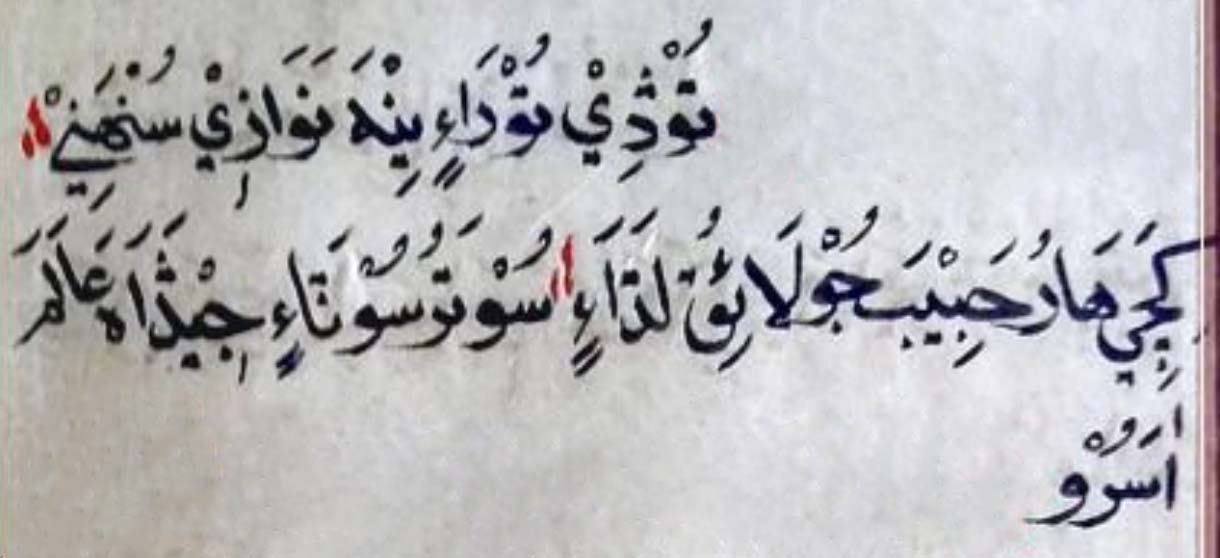Lexical Density of the verse, for usage of Artificial Intelligence (AI) & Computational linguistics
| Number of words: | |
|---|---|
| Lexical Words:* | |
| Non-lexical words:** | |
| Lexical Density: |
* Words of Noun, adjective, verb & adverb
** Words of Pro-noun, post-position, conjunction & interjection
داستان اندر ٻيو اندراج
- (بيت) اَدا اي ٻانڌِي! توکي ڪَڙَھان…
- (بيت) توڏِي تُھائِين جٖي، سي ھِتَھِين…
- (بيت) توڏِيءَ کي تَعظِيمَ، ٻِيَنِ سَڀَنِئان…
- (بيت) تَڙِ تَڪَڙِ تارِ گِهڙَڻُ، اِيءُ…
- (بيت) جهولَ نَہ جَهلِي سُهڻِي، سائِرُ…
- (بيت) جِئان وَھي تِئان واٽَ، ڪَپرو…
- (بيت) جِئان گِهڙي تِئانِ گهيڙُ، ڪَپَرو…
- (بيت) سارِي سِکُ سَبَقُ، شَرِيعَتَ سَندو…
- (بيت) ساوَڻَ گهِڙي سَڀَڪا، ھِيءَ سَرَھِي…
- (بيت) ساھَڙُ سَڏَ ڪَري، پَرِينءَ ڀَرِ…
- (بيت) سُهڻِيءَ ليکي سِيرَ جو، پاڻِي…
- (بيت) سُڪي ھُئَڙا گَڏُ، ٻانڊَ مِڙيئِي…
- (بيت) سِياري سِھَ راتِ ۾، جَا…
- (بيت) سِھَ سِيارو پاڻِي پارو، جِتِ…
- (بيت) صَبُرُ شاڪِرَنِ، آھي اوطاقُنِ ۾،…
- (بيت) طالَبَ ڪَرِ توڏِي، جي تُون…
- (بيت) نَہ ڪا جهولَ جَهليسِ، نَہ…
- (بيت) واھُڙَ وَھِين مَ شالَ، ڦِٽِي…
- (بيت) واھُڙَ ڀَرِيُون مَ پاءِ، تو…
- (بيت) وَڃي ڪُنَ ڪَپِيندِي، سُهڻِي مَنجهان…
- (بيت) وِيندي مُنڌَ ميھارَ ڏي، ڪَري…
- (بيت) ٻانڌِي جَي ٻيلِي ٿِيين، تَہ…
- (بيت) ٻِئون گهِڙَنِ ڏِينھَن، ھِن ڀِنيءَ…
- (بيت) ٻِيُون سَڀَ گهِڙَنِ ڏِينھَن، ھِيءَ…
- (بيت) پَل پَل ٿِئي پَلِي، ڏَمَ…
- (بيت) ڀَلو ڀَلو ٻانڊَ، لُڙِھين لَهِرِنِ…
- (بيت) ڌَڌِڪا دَورَ دَرياھَ ۾، جَڏھِن…
- (بيت) ڪَنھِن جَنھِن گهيڙِ گِهڙِي، جِيئَن…
- (بيت) ڪَڙِ ڪَڙِ ڪُنَ مَ وَڄُ،…
- (بيت) گهيڙان ڪَري نَہ گُهورَ، تَڙِ…
- (بيت) گَهرين جٖي گهارِينِ، سي ڪَمِيڻِيُون…
- (بيت) گِهڙي ۽ گهوري، مَٿان پِرِيَنِ…
- (بيت) گِهڙَڻُ وَھِيڻُو مُون، مِلَڻُ ھَٿِ…
- (بيت) ھُئِي طالِبِ حَقَ جِي، توڏِي…
- (بيت) ھُو پُڻ ڏِينھَن ڏِٺاءِ، ھِي…
- (بيت) ھُو پُڻ ڏِٺَئِي ڏِينھَن، ھِي…
- سُر سھڻي جَي سانوڻ، سيارو گهڙي ۽ گهوري جو بيت
توڏِي توڙائِين، نِينھَن نَوازِي سُهڻِي،
ڳِچِيءَ ھارُ حَبِيبَ جو، لائِقُ لَڌائِين،
سو تَڙُ سُوٺائِين، جيڏاھَن عالَمَ آسِرو.
رسالن ۾ موجودگي: 73 سيڪڙو
سمجهاڻي
سهڻي ازل کان محبت سان نوازيل هئي، تڏهن تہ ٻنهي جھانن جي حبيب جي محبت کيس حاصل ٿي (پنھنجي گلي ۾ هن جي محبت جو هار وڌائين). هن ڪروڙين انسانن جي رهبر ۽ رهنما، سونھين ۽ سردار حضرت محمد صلي الله عليه وسلم کي سچيءَ دل سان مڃيو. (هوءَ ڀاڳ واري هئي جو) اهو تَڙُ يا ماڳ ڳولي لڌائين جنھن جو سموري جڳ جھان کي آسرو آهي.
[ شارح: ڊاڪٽر عبدالغفار سومرو ]
گنج ۾، سرود سھڻي، بيت نمبر : 1703
تُوْڎِيْ تُوْرَاءٍ نِيْهَ نَوَازٖيْ سُنْھَنِيےْ﮶
کِچِيَ هَارُ حَبِيْبَ جُوْ لَائِقُ لَڌَاءٍ﮶
سُوْ تَرُ سُوْٽَاءٍ جٖيْڎَاہَ عَالَمَ اٰسِرُوْ﮶
ھِي بيت ٻين سھيڙيندڙن وٽ ڏِسو
TRANSLITERATION
सिन्धी देवनागिरी
तोडी॒ तोड़ाईं। नींहं नवाज़ी सोहणी।
गि॒चीअ हारु हबीब जो। लाइक़ु लधाईं।
सो तड़ु सूठाईं। जेडा॒हं आलम आसरो।
ROMAN SINDHI
Toddi torraayi'en, neenhan nawazi suhnni,
Ggichi'a haar'u Habeeb'a jo, laiq'u ladhaa'en,
So tarr'u soothhaai'en, jeddahan aalam'a aasiro.
TRANSLATIONS
The Divine love had favoured the young Suhni from the infinity. (In addition) she discovered the worthy personality (i.e. the Prophet) who was symbollically the Divine, (or her) necklace. Coincidentally her discovery has proved to be a very safe ford, because the hopes of the mankind are pivoted on it (i.e. it has usefully served and shall continue to serve the whole humanity.) (The Prophet is the mainstay for the entire mankind).
Note: There is yet another interpretation of this verse. If we identify Suhni with the Prophet of Islam, then the verse may be translated as under:
From infinity the Prophet was favoured by Allah. (There is a tradition that the Prophet was appointed as the apostle even when the clay mould or skeleton of Hazrat Adam was not clothed with flesh.) The Prophet was solely considered quite eligible for the unique honour. He was worthly to wear the Divine necklace.
باز گشت ازدم او ہر دو باب
در دو عالم دعوتِ او مستجاب
(Roomi)
The prophet's mere breath opens both the doors (of the two worlds). His blessing is acceptable in both the worlds.
Suhni from eternity was one by love selected,
With Lord's union's garland she was graced,
That bank she reached, where world's hope resides.
From the very beginning love had favored Sohni,
She had the garland of beloved's love round her neck,
She found the ferry upon which all mankind depends.
من الأبد لقد من اﷲ عليها - الحب فى النهاية - هي حصلت - قلادة جميلة- للحبيب - وحصلت الوصال.
ووجدت المعبر يوجد فيه - حبيبه ومرجعه .
سر تے ہتھ عشق سچے دا سوہنی کیوں گھبرائے
سِک ماہی دا ہار گلے وچ اوہ کیوں ترلے پاوے
عاشق مرشد لانگھا دسیا، نال صدق دے لنگھی
سوہنی نے ہمیشہ سمجھا ہے
اک مہینوال کو گلے کا ہار
اس جہانِ بسیط میں اس کو
جز غم عشق کچھ نہیں درکار
اس کو روزِ ازل سے ہی، عشق ہوا تھا حاصل،
میں گلے کا ہار حبیب کا، جسکے تھی نہ قابل،
پائی تھی وہ منزل، سب کا جہاں سہارا۔
ھِن سُر جي راڳ بابت

سھڻي: شاستري سنگيت ۾ ماروا ٺاٺ جي راڳڻي آھي. ھيءَ راڳڻي عام طور تي رات جي پيون پھرن ۾ ڳائي ويندي آھي. سرن جي لحاظ کان آڏو، شڌا آھي.
ٺاٺ: ماروا
سُرن جي بيھڪ:
آروھا: سا گا ما ڌا ني سا
آوروھا: سا ني ڌا گا ما ڌا گا ما گا ري سا
ھن راڳڻيءَ جو وادي سر ”ڌا“ جڏھن تہ سموادي سر گا آھي. ھن راڳڻيءَ ۾ ري کان سواءِ سڀ سر تيور ۾ آھن.



